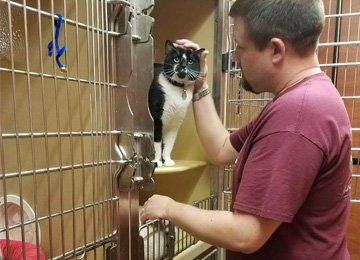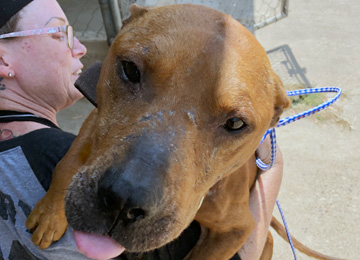Animal Rescue and Taxation New Law Gives Rescues, Shelters Equal Footing
For a homeless pet, the biggest difference between staying in a shelter and living with a foster caregiver may simply be the chance to enjoy the comforts of a home while waiting for a “forever” adopter. But before the 87th Legislature took action this year, for pet rescue organizations, the difference in pet accommodations had the potential to negatively affect their ability to save homeless pets.

Senate Bill 197, approved by lawmakers and signed by Gov. Greg Abbott, allows nonprofit animal welfare organizations that depend on foster homes to receive the same sales tax exemption on animal adoptions as nonprofit groups that use shelters. SB 197 takes effect Oct. 1, 2021.
Prior to this law, the state provided a sales tax exemption for animal adoption fees collected by nonprofit animal shelters. By definition, the exemption applied only to organizations that maintain a physical shelter, which caused confusion and created a disparity among organizations established to help animals find forever homes.
SB 197, authored by Sen. Jane Nelson and sponsored in the House by Rep. Candy Noble, clarifies that rescue groups housing animals outside of organization-owned shelters are eligible for the sales tax exemption on adoption fees. The Comptroller’s office and animal welfare groups advocated for the legislation.
“The spirit of this law was always to exempt rescue organizations as they work to find forever homes for stray animals. This is the right thing to do and will help connect more animals to people who will love and care for them,” says Nelson, Senate Finance Committee chair, who had a rescue “grandpup” named Popper whom her family lost last year.
Noble says that as a rescue pet owner, she understands the commitment each pet adoption entails.
“It is a great honor to have helped pass legislation that makes pet adoptions more affordable for willing Texans,” Noble says. “Families who are willing to open their homes to unwanted animals through pet adoption should be applauded by Texans, not taxed by the state. The efforts of those who work in our rescue and shelter organizations should be rightly focused on the care and placement of the pets, not on the collection and paperwork associated with sales tax receipts.”
Collecting and Scrutinizing Taxes
Texas Comptroller Glenn Hegar is the state’s tax collector, but he also works with lawmakers to eliminate taxes that are outdated, inefficient to collect or out of step with legislative goals. He has done so since taking office in 2015, when the Legislature repealed eight taxes on his recommendation (Exhibit 1).
Exhibit 1: EIGHT TAXES RECOMMENDED AND APPROVED FOR REPEAL IN 2015, 84TH LEGISLATURE
Upon taking office in 2015, Comptroller Glenn Hegar pushed for the repeal of certain state taxes to remove archaic laws from state statute, reduce administrative burdens on business owners and provide tax relief to Texans.
- State Inheritance Tax
- Controlled Substances Tax
- Airline/Passenger Train Beverage Tax
- Liquefied Gas Tax
- Bingo Rental Tax
- Fireworks Tax (still subject to sales tax)
- Oil Regulation Tax
- Sulphur Tax
Source: Texas Comptroller of Public Accounts
“Our agency is more efficient and can better serve taxpayers when we do away with the red tape and burden of outdated or inefficient taxes,” Hegar says. “The resources needed to administer these tax laws should instead be used to make sure Texans receive the best possible government at the lowest possible cost.”
Per statute, animals are considered tangible personal property subject to the sales tax unless they fall under a specific exemption, explains Tommy Hoyt, assistant director of the Comptroller’s Tax Policy Division. Creating a sales tax exemption requires legislative action.
Katie Jarl Coyle — director of government affairs and policy for Austin Pets Alive! and American Pets Alive! and executive director of the nonprofits’ advocacy arm, Texas Pets Alive! — says the Comptroller’s office was a positive force in changing the law to allow the exemption.
“They have been very supportive,” Coyle says. “The Comptroller’s office worked thoughtfully and cooperatively with the stakeholders on this issue. That contributed to its success.”
SB 197 was the first legislative measure pushed by Texas Pets Alive! and its first big win at the Texas Capitol, Coyle says.
Adoption fees vary from organization to organization, ranging from zero to about $250, Coyle says. But rescuers say the fees don’t come near covering necessities like urgent medical needs, spaying or neutering, training, vaccinations and supplies.
“With small local rescues, every dollar counts,” says Coyle.

Matthew Porter, Texas Little Cuties Rescue volunteer and mayor of Wylie, Texas
Photo courtesy of Matthew Porter
Wylie Mayor Matthew Porter, who with his wife volunteers with Texas Little Cuties Rescue, had brought his concerns about the sales tax to Rep. Noble and says he appreciates her and others who championed the legislation. “Rescues were looking at having to cover costs out of pocket,” Porter says. “If we eat the cost ourselves and we do a couple hundred adoptions a year, that [money spent on taxes] would be enough to provide veterinary services to five to 10 additional animals.”
While registered nonprofit animal organizations generally are exempt from paying sales taxes on their purchases, they have been responsible for collecting sales tax from adopters on adoption fees. That required keeping records, collecting and remitting the tax, and choosing whether to increase adoption fees to include the sales tax or absorb the cost in the existing fee.
“I truly felt it was common-sense legislation that shouldn’t face political barriers,” Porter says of SB 197. “Rescues provide a service to the public and to all of those individual animals at the shelter. When the rescues help adopt out and care for those animals, it helps prevent additional costs to the state and local government.”

Lori Bowlin, founder/vice president, Coalition for the Prevention of Animal Cruelty
Photo courtesy of Texas Humane Legislation Network
Lori Bowlin, founder and vice president of the Coalition for the Prevention of Animal Cruelty in Crockett, Texas, says SB 197 is a “huge” plus. Her small rescue helps animals in several counties, including picking up puppies dumped on county roads and rescuing donkeys, horses and dogs abandoned in Davy Crockett National Forest, she says.
Her rescue group fosters animals but typically doesn’t directly arrange adoptions. Instead, she connects the animals with rescue partners that find homes for them.
“Anything that costs rescues money causes issues,” Bowlin says. “We are all on a tight budget. Every single one of us depends on donations and grants.”
A fiscal note for SB 197 determined it would pose no significant fiscal implications to the state or local governments.
According to the independent pet insurance marketplace Pawlicy Advisor, 58.2 percent of Texas households own a pet (Exhibit 2). In fiscal 2020, thanks to pet ownership, Texas collected about $120 million in sales tax from pet supply stores and other companies that provide pet services, such as grooming, boarding and training.
Exhibit 2: TEXAS PET OWNERSHIP NUMBERS
- Texas households that own a pet: 58.20%
- Texas households that own a dog: 43.40%
- Texas households that own a cat: 20.50%
Source: Pawlicy Advisor; American Veterinary Medical Association
Rescues to the Rescue
While nonprofit shelters, including government-run shelters, provide a haven for many animals, they can be overloaded with the influx of homeless pets. Rescue groups provide a lifeline.
“Shelters and rescues collaborate to rehome adoptable animals, so releasing pets to rescue partners allows shelters to avoid euthanizing animals for space,” says Stacy Sutton Kerby, director of government relations for the Texas Humane Legislation Network. “Rescues will be able to use the money previously paid in taxes to serve more animals.”
Rescue groups also divert animals from shelters by taking them directly from families who can’t care for them, says Laura Everitt, a volunteer with Austin Boxer Rescue and DFW Boxer Rescue.
“If the sales tax requirement had stayed in place, it could have very likely caused some smaller rescues to close their doors, and that would have put the animal population at higher risk,” Everitt says.
According to a survey by the American Pet Products Association, 44 percent of dog owners and 43 percent of cat owners in the United States adopted their pets from shelters or rescue organizations (Exhibit 3).
Exhibit 3: PERCENTAGE OF DOGS AND CATS ADOPTED FROM U.S. RESCUES OR SHELTERS
| Source of Pets in U.S. | 2019-20 APPA Survey |
|---|---|
| Dogs adopted from a shelter or rescue | 44% |
| Cats adopted from a shelter or rescue | 43% |
| Dogs taken in as strays | 5% |
| Cats taken in as strays | 21% |
| Dogs acquired from friends or relatives | 18% |
| Cats acquired from friends or relatives | 21% |
| Dogs purchased from a pet store | 9% |
| Cats purchased from a pet store | 12% |
| Dogs purchased from a breeder | 19% |
| Cats purchased from a breeder | 3% |
| Dogs bred at home/from owned pet | 4% |
| Cats bred at home/from owned pet | 2% |
| Dogs received as a gift | 5% |
| Cats received as a gift | 3% |
Source: The Humane Society of the United States; biennial APPA National Pet Owners Survey by the American Pet Products Association
Most animals that Austin Pets Alive! (APA) pulls from Austin Animal Center have medical or behavioral issues, Coyle says, and their care costs more than the average intake. APA spent more than $4 million last year on animals received from the center, she says. It typically adopts out about 10,000 animals annually, she says.
After February’s ice storm, American Pets Alive! (AmPA) reached out to rural Texas shelters overwhelmed with animal intakes as they struggled with water supply and building repairs. The shelters faced the prospect of euthanizing animals as they ran out of space unless rescues could help.
AmPA took more than 1,000 animals from the hardest-hit shelters, Coyle says, transporting them to shelter partners across the country. The operation was paid for through private funding, with no cost to local governments, she says.
Kerby says, “Eliminating the rescues’ requirement to pay taxes only makes sense when considering how closely these entities work together to achieve their common goal: the highest possible live outcome rate.”
“It’s a win-win,” Hegar says. “There’s a saying that if you want a friend in politics, get a dog. But with this legislation, the state is helping dogs — and their taxpaying families.” FN

